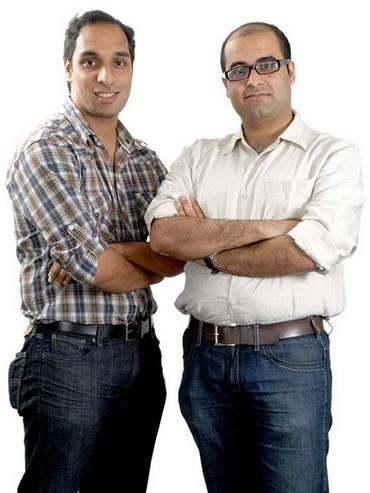
Meet IITians Aneesh Reddy and Krishna Mehra whose company Capillary Technologies has grown from a garage start-up to a 150-member strong company with operations across India and in the UK, Middle East and South Africa.
In the winter of 2008 Aneesh Reddy and Krishna Mehra -- both IITians -- decided they'd had enough of being cogs in the wheels of large organisations.
So they quit their jobs and set up their own firm. Capillary Technologies was set up in a place from where some of the greatest tech firms have started their successful journeys -- the family garage of one of their founders.
Less than three years later, the company that works in the customer engagement solution space employs 150 people across India, Middle East, the United Kingdom and South Africa. Of these about 50 are from top tier colleges such as IIT, BITS and IIM among others and have previously worked in companies such as Oracle, P&G, Dell, Microsoft, ITC, Fair Issac and Dunhumbvy.
In October, Capillary Tech won the Entrepreneurial Excellence Award at TiECon in Delhi.
The award is given away by TiE (The Indus Entrepreneurs) Delhi that 'recognises early stage entrepreneurs who started and have achieved a certain degree of success'.
Capillary Tech stood out amongst over 150 start-ups from across the country that were in the same race.
In an email interview, Reddy and Mehra spoke to us about their success journey.

Could you tell us something about what Capillary does?
Capillary is one of the faster growing technology product companies in the customer engagement solution space, qualifying to be the largest Retail CRM (Customer Relationship Management) provider in the country, with over 6000 store installations for over a 100 retail brands.
We have over 15 million end consumers registered on our platform for our retail clients.
Established in 2008, Capillary provides next generation customer engagement solutions to retailers and consumer facing businesses.
It has been instrumental in revolutionising the traditional loyalty programme space with paperless and hassle free programs with best-in-breed technology that bring the power of real-time engagement and delight customers at every step, right from registration to rewards.
Aneesh, you were offered a scholarship at the Massachusetts Institute of Technology (MIT). Why did you turn it down?
Aneesh: At IIT, I was involved in all kinds of activities beyond just academics and grades -- some of these were running a Robotics club, organising the annual Robotics event of IIT and setting up the Entrepreneurship Cell among others.
I was also actively involved in technical research and had published a couple of international journal papers; I had also applied for a patent, which got granted in 2009 after I passed out of IIT.
Having seen success in both research and also in starting something new like the ECell, I was reasonably sure I wanted to start up (something) sometime soon and not do more research after I left IIT.
I had the option to join ITC, which was a day zero job I had got at IIT, or to join the Aerospace Department at MIT where I also had the opportunity to pursue my higher studies.
I chose to join ITC because I wanted to work for a few years, get some understanding of industry and then start (out as an entrepreneur). After a couple of on the ground, hands-on/ learning filled years in ITC in end 2008, Krishna and I started Capillary.
The ITC stint was a great game changer for me, helped me understand how things work in an industry, helped me build better people skills and also helped me transform myself from a research oriented techie, to more of a 'real world' guy.

How and when did you meet? And how did the entrepreneurship bug bite you?
We knew each other from our IIT days -- we were actually hostel mates and lived three rooms apart during our undergrad years.
Both of us had a common goal of becoming successful entrepreneurs and we were confident that by brining together our best skill and knowledge, we would be a force to reckon with instead.
After graduating from IIT, we went our different ways to work. Two years later we met on Krishna's birthday in 2008 when the entrepreneurship bug bit us again and we decided to take the idea forward.
Ever since, there has been no looking back and we have successfully paved our growth story.
Krishna, it'd be interesting to know about your time at the Entrepreneurship Cell that you helped establish at IIT. What was the idea? How did you go about setting it up?
Krishna: The idea of the Entrepreneurship cell came up came up more as a need out of the amateur Robotics club under the Innovations Lab (iLabs) cell on campus. There were a couple of interesting ideas in the Robotics club which needed funding to start up.
With no existent Entrepreneurship cell (ECell), it was extremely difficult to get started thus the initial idea was to start an ECell under iLabs itself.
However the iLabs did not have the funds to support an ECell so we approached Professor Dr PP Chakraborty, the Dean of the Sponsored Research and Industrial Conusltancy (SRIC) Cell to help us out.
Professor Chakraborty was very appreciative of the idea and we setup the ECell right away, under the aegis of SRIC.
As part of the ECell, we also differentiated from other ECells by ensuring that companies which started up from IIT Kharagpur would get a Rs 15 lakhs soft seed loan (after screening by a committee of professors) rather than just office space which other IITs were offering.
The soft loan means that you pay back if the company does well otherwise the loan is written off against the 3 per cent equity given to IIT.
Also to boost the number of start-ups from IIT, we had also put in place a Deferred Placement Option for students who started up. In case the start-up did not do very well, the students who started up could sit for placements under the IIT Placement Cell after two years of starting up.
With these two catalysts implemented the number of start-ups from IIT Kharagpur has steadily grown over the years.

Could you tell us something about your previous job assignments?
Aneesh: I was working for ITC Limited as a project engineer and was heading the machinery equipment management for ITC's Bangalore facility. I was also part of the team setting up ITC's new Greenfield tobacco factory in Pune worth over Rs 700 Crores.
Krishna: I worked at Microsoft Research and my contributions have led to six patents and seven international conference papers on software development, Internet collaboration and data intelligence.
I was also was part of the initial six member team at Minekey Inc, a venture-backed Santa Clara-based start-up in the news recommendations space.
Why did you quit your jobs and start this company?
As young entrepreneurs we could take the risk of starting our own venture and work towards setting up a successful business. This needed each of us putting in our 100 per cent and it would not have been possible to do so if we were still working.
How many people does Capillary Tech employ?
We currently employ about 150 people across India, Middle East, United Kingdom and South Africa. About 50 of these are from IITs/BITS/IIMs and other top tier colleges, and have previously worked in companies like Oracle, P&G, Dell, Microsoft, ITC, Fair Issac, Dunhumbvy among other reputed companies.

Could you tell us how you went about setting up Capillary?
We wanted to do something that combined mobile and retail. Mobile was growing rapidly in India, and retail was just beginning to happen.
So we quit our jobs and started Capillary in end 2008.
We started digging deeper to understand opportunities. Speaking to many retailers, small to big we understood that they wanted us to help find their old customers and get them back to the stores rather than just getting them new customers.
As we dug deeper, we found that the loyalty card programmes did not work out to the retailers' expectations.
Most customers didn't like the idea of filling forms to obtain the card and carrying the card to swipe and earn points every time they shop. People also did not want to carry too many cards.
This insight enabled us to move everything to one device, the mobile phone, and start engaging with that unique phone number the customer has without filling up forms.
Though this idea was a success among retailers, none were willing to pay too much for it. So the two thought of having the solution on a cloud computing model, and charge on a per-store-per-month basis.
In March 2009 we launched our first product -- !nTouch.
How did you organise funding for Capillary Tech?
We both put in Rs 50,000 from our personal savings. We also went back to the ECell we had started at IIT and applied for the Rs 15 lakh seed loan. We were screened by a committee of professors and the loan was approved. We have also paid the loan back earlier this year.

What did your families have to say about you quitting your jobs and starting out on your own?
Krishna: My parents always wanted me to do something on my own.
It was great to see the support and encouragement I was getting from my parents, in fact we started Capillary Tech in the garage of my house in Kolkata!
Aneesh: My parents were initially apprehensive that I was leaving a good job and taking a lot of risk, however they have always been very supportive of everything I have done and wanted to do.
What were the greatest challenges you faced while setting up?
Being able to recruit high quality talent as you are a small start-up. We learnt the hard way that stock options are of no value when you are a small start-up without any proven success as yet.
We also faced a lot of issues with recruitment and building the team as we started in Kolkata. We shifted base to Bangalore within a year of starting up
We tried dabbling with a couple of other ideas, a comparison shopping service, a GPS based app. We spent almost 3-4 months trying to figure out what would work. These ideas were essentially fast failures on which we finally arrived at our current product.
As a start-up it becomes extremely tough to get your first client, and we did not want to devalue our proposition by offering it free.
So it took us almost 6 months since we started in August 2008, to find our first client in Indus League Clothing Limited, a Future Group company. Perseverance is very important for a start-up.

What are the greatest challenges you continue to face today?
Recruiting good talent against the likes of Google, Yahoo etc is a challenge.
We have seen some very good traction in the new geographies we are expanding into UK, Middle East, Singapore etc, however each new place is like a new start-up with a lot of challenges.
As we have rapidly grown to over 100+ clients and over 150 employees, we have seen the importance of setting up robust processes. And setting up these processes is an ongoing journey for a quickly evolving company like ours.
As a country we are not very start-up friendly from a regulation front. There is a lot of paper work required to do things as simple as signing up advisors, issuing shares to foreign/ NRI investors etc. Although it is not a major challenge, it is for sure a major drain of your time as founders.
What were the five greatest learnings from this exercise?

Could you offer five tips for young entrepreneurs.